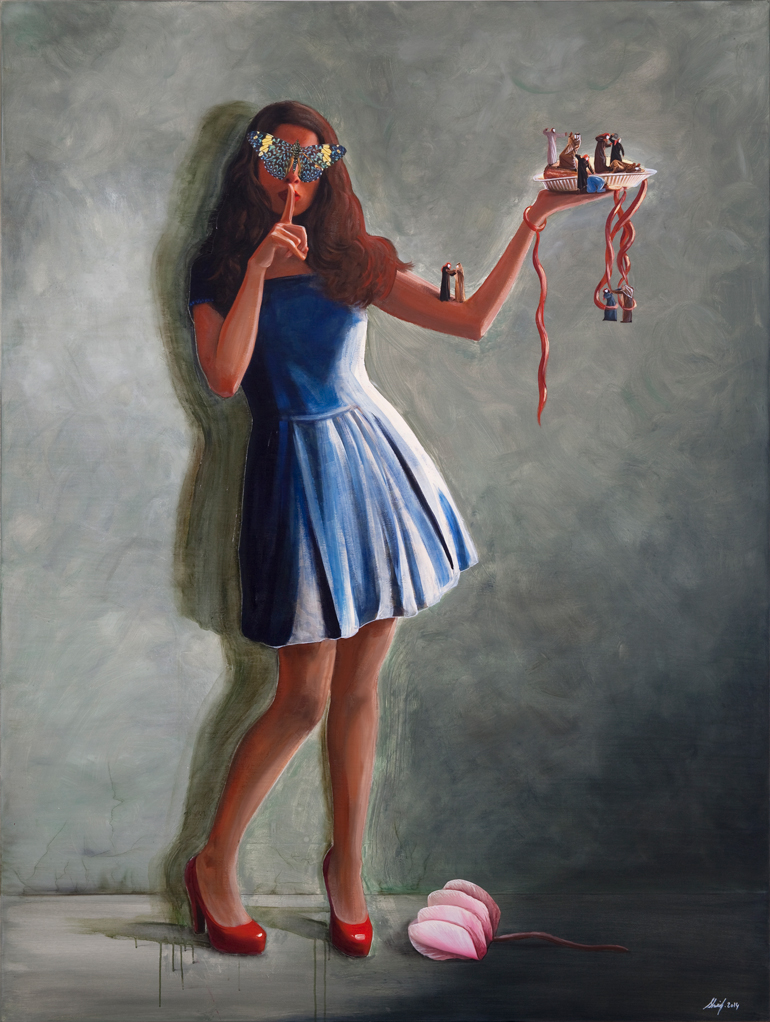
When men ask me where I am from, I make them guess. It gives me pleasure to watch their eyebrows furrow, their lips twitch as they search for clues on my face as though it were a map. I find it exciting – watching them fluster and hesitate to share their thoughts with me. I like that they’re scared of being wrong. I like the way they look at me before they answer, squinting in what can only be described as a dangerously pensive manner. They hope their guess won’t insult me, thus putting an end to what is just the beginning of our conversation…
Let me be the curly haired Brazilian in the room tonight. Imagine me at Carnival. Let me sway my Colombian hips to the beat, show you the ways they don’t lie. Let me purr in your ear the way you think a Persian woman does when she’s pleased. Give me some vino, and let me be la signorina bellissima stasera. I’ll tell you about summers in Sicily, then curse at you in a language you can’t understand. I trust that these are the types of fetishizing thoughts – of “exotic” fantasies – running through the minds of the men as they try to place me. There’s just so much sex appeal in the Other.
I am a curly haired brunette with dark eyes and a skin tone ambiguously between fair and olive. My figure is curvy, my eyelashes are thick, and my English is flawless. This works, of course, to my advantage in this game, leaving a lot of room for guessing. I don’t mind the guessing, though. I enjoy it. Perhaps it’s because I’m a writer. Because I let the guesses open doors to all the lives I could be living, all the characters I’ve yet to meet. Or because I crave the stories and poems that are the very potential of this banter – sometimes the best stories are birthed in anonymity. Perhaps it’s because as long as we’re playing the guessing game, we’re keeping the conversation superficial enough for me to be myself. Unfortunately, it’s always a matter of minutes before the game is over. And it’s always the same question that brings it to an end: “What’s your name?”
The moment I utter the Arabic letters of my strange name, all that I was before this moment disappears. I become not what I am, but what you think an Arab woman should be – what she is. Assumption fills the head of my conversation partner faster than air escapes a punctured balloon; I am Ali Baba, Jasmine-Oil-Princess, and sexually repressed, physically oppressed helpless-woman-soul all at once. What comes next is always the same.
They hear “Ahd,” and they ask where I’m from. They hear Saudi Arabia, and their head starts to spin; I watch it happen every time. I’m not doing or saying or wearing what women from Saudi Arabia do or say or wear. How can this be? They become uncomfortable when things don’t fit conveniently into the foundations their grandfathers laid out for them as little boys. And so, like good grandsons and upstanding cultural citizens, they push on with questions. They probe, they invade my personal space, and they interrupt what could have been a half-decent conversation in order to resolve their pressing issue re how I exist as I do (outside the margins etched into their minds regarding me and my “type”).
The questions come in all kinds of forms – whether I “have to” constantly go behind my family’s back, whether my parents would “approve” of my outfit, how I feel about “having to” marry a Saudi man, or about “having to” go back to the country. Lately, the questions even make their way towards ISIS and “how I feel” about terrorism. Notice how heavily laden with assumption each of these questions is. Feel with me, for a moment, that weight. Feel it shoved in your face as you’re pushed under the interrogation spotlight, yet again, by another aggressive and “genuinely curious” stranger. Feel with me, for just a moment, the weight of my body and the letters of my name outside the Middle East.
I often think of how much easier it would be if I didn’t have to deal with so many assumptions all the time, how much less exhausted I would feel. My name binds me to a language considered that of killers. Words like “Allah” and “Jihad,” misused and misunderstood only to be plastered across screens and headlines, resting violently in people’s pockets and living rooms — making homes in their minds. The Arabic language has been accused by the western world of committing a gross crime. And in adhering to this biased and inaccurate narrative, we deny all the beauty and strength that the language has to offer – all that it’s given in the past. We forget the music of Um Kalthoom, Fairuz, and Abdelhaleem. We forget the writings of Gibran and Darwish. We forget the waves of succulent words – of poetic tenses and meanings that simply cannot be translated into any other tongue. The poetry living within the Arabic language is undeniable. And poets (generally speaking) don’t kill people; they kill fantasies.
Each image described in a poem, each sound expressed within its lines forms an offering. The offering is that of an original experience – an experience that changes every time the poem is read, no matter if read by the same reader. Each line of a poem carries in it a small death – a contained end. And the reader subtly experiences all of these ends, feels them as he or she continues to move through a poem. The larger end, of course, being that of the collective offering – that of the poem itself. Poetry is rooted in reality – in accepting change, complexity, and most importantly: endings. Fantasy, on the other hand, is rooted in the unlimited, the unending, and the unreal. It can only live, isolated in our imaginations.
My Arabic name, when spoken to these men, immediately erases the fantasy of me. I love it for that. I also love its meaning in the language: Ahd means promise, or covenant. My name represents the way I want to live my life. I want to live with dignity, with truth, and with love. I promise myself to live in the ways that please me firstly and fore mostly – not in ways that please Arab or Western societies, and certainly not in ways that please men.
My name is Arabic and I am Arab, yes. Though this is far from all I am. My Arabness is a part of me, like the parts of my body. It’s connected to me, though it is in no way my entirety. The fact that men choose to see me as a mere part of who I am will always remain their loss. To view me solely as the Other, or as a female body, is to view me falsely. My being cannot be confined to specific categories, and to attempt to do so would be to refute the natural phenomenon that is growth – that is consistent change. Humans are beings that are ever changing, as both history and personal experience show us. From the formation of nation states to broken relationships and transformed passions and careers, we’ve never stayed the same. To be human and alive is to move – to change, contradict, and proceed. To die is to be placed in a static category, marked permanently: deceased.
